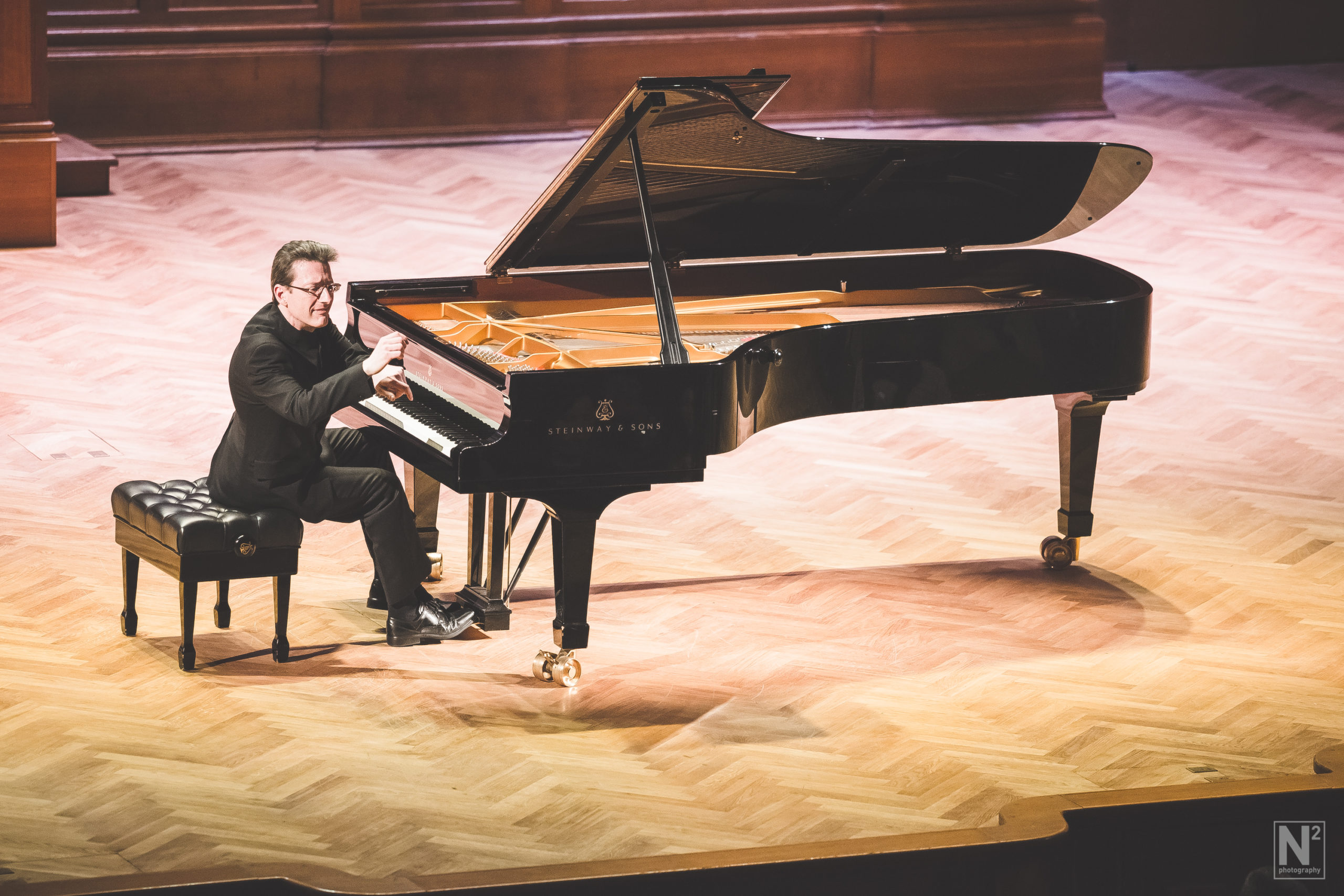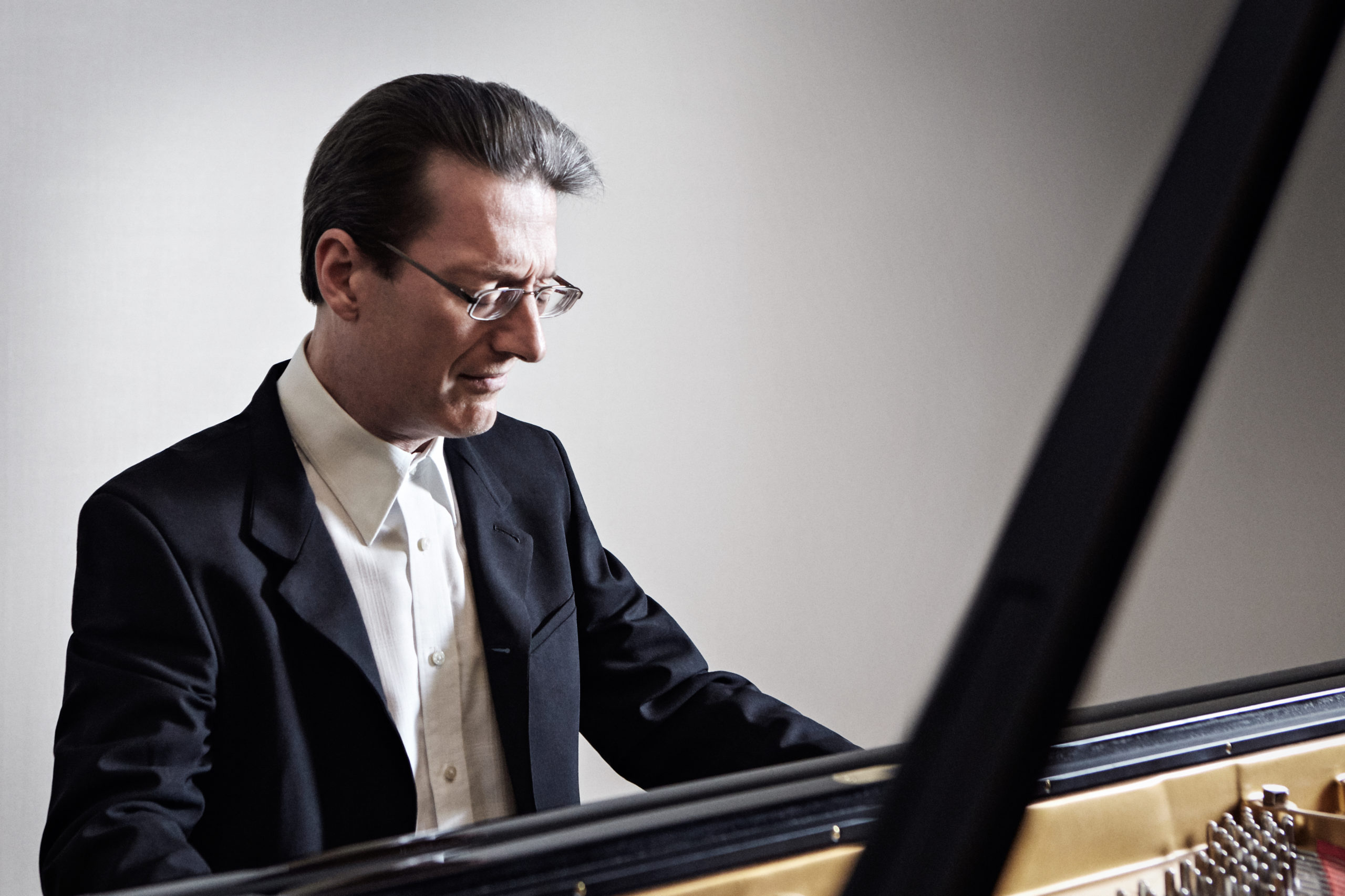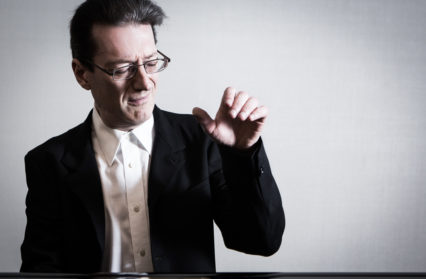The pandemic has led musicians major and minor to be resourceful – and reflective. Celebrated Welsh concert pianist Llŷr Williams tells Nigel Jarrett about digital streaming, Beethoven and Schubert, whizz-kid prodigies, and the joys of walking the wild places of Britain.
Lockdown has resulted in some unusual sights, not least a video address to the music lovers of Mexico by Llŷr Williams from the garden of his home in North Wales: ‘Soy Llŷr Williams y les hablo hoy desde mi casa en el Norte de Gales…’
Well, he spoke in English and the Spanish was in the form of subtitles but the overarching message was clear. Here was one of the leading musicians of his generation embracing technology to reach an audience cut off from his ‘live’ presence by Covid-19 restrictions. And he believes the use of digital science by music-makers is unlikely to end when the pandemic does.
Llŷr Williams was due to perform the thirty-two piano sonatas of Beethoven for the first time in Latin America at the Festival Cultural de Mayo en Jalisco in Guadalajara. Not to be outdone by a mere virus, he recorded the sonatas at home. Thanks to some gizmo trickery from Signum Classics, his record company, and the famous sound engineer Mike Hatch, the Mexicans could tune in to the performances. So could millions of others worldwide.
The Covid-19 restrictions also meant that piano technicians were not available in the area to tune his instrument to the ringing pitch required for concerts, but there were unintended advantages. ‘I guess in a sense it was appropriate, because Beethoven’s own piano would not have been in tune,’ he said. ‘Also, Beethoven would not have been able to hear because of his deafness. It brings home his own isolation: he was isolated from the society around him, and it makes his music at this time poignant and relevant.’
Llŷr Williams has already recorded the Beethoven ’32’ in a boxed edition for Signum Classics called Beethoven Unbound, to be followed this autumn by a similar one of Schubert sonatas. The Beethoven discs include music other than the sonatas – the Diabelli Variations Op. 120 and a few Bagatelles, for examples – and were recorded live at the Wigmore Hall in London (a series repeated over a similarly wide time span at the Royal Welsh College of Music and Drama in Cardiff). Stephen Pritchard in The Guardian, writing of the Beethoven box set, said Williams displayed ‘ profound intelligence and a wittily knowing ear for the quirky surprises Beethoven lays in the pianist’s path.’ (It’s difficult if not impossible to find commentators expressing anything other than praise for the Welsh pianist.)

Beethoven boxed also involved the sort of available technology Williams refers to here, in that all the Wigmore Hall rehearsals were recorded and therefore anything ‘live’ with which he was less than happy could be remedied by editing. Audible coughs and fidgets among the audience could also be magicked away. ‘The lockdown is a very anxious time for the arts in general,’ Williams told me. ‘Being a soloist I’m more fortunate than freelancers who work with orchestras and choirs. We have to embrace digital technology and other means to get us through this period. And even when things return to normal they will continue to play a part in musical life – maybe live concerts being simultaneously streamed online.’
Normality may not have arrived before the Schubert recordings are issued. Their close proximity to the Beethoven ones, however, will afford the opportunity to hear Williams in his element. ‘I find there is so much variety in Beethoven and Schubert, both of emotion and colour, and so I never get tired of them,’ he said. ‘For a time, I didn’t want the Wigmore Hall recordings to be superseded but staying in the same place interpretatively does not exist for a real musician; so, when preparing for these Mexico recordings, I very quickly gave up trying to follow the CD versions and often found new solutions for various passages.’
‘One of the fascinating things about Beethoven is that you can find different speeds and colours, for example, while still remaining true to the spirit of the composition.’
This fixation on Beethoven and Schubert is only momentary. ‘I play a large amount of early 20th-century music from many different countries, including Debussy, Albeniz, Janacek, Bartok and Scriabin.’ he said. ‘Contemporary music might well come at a later stage but I have to be totally comfortable with whatever I play. There is some music which, although I love, I feel I wouldn’t be able to play at least as well as some of my other pianist colleagues. So, it’s not worth spending too much with it. Examples include Bach, the Prokofiev sonatas and a certain type of etude/toccata-like piece which the next whizz-kid to come out of China or Russia is going to be able to play twice as fast!’
Tempo is a quality Llŷr Williams refers to amusingly when discussing the role critics play in the life of a musician. Almost without exception, his arrival in public after a glittering career at Oxford University and the Royal Academy of Music, and without entering one of the big gladiatorial competitions, was greeted with superlatives. He admits to reading his reviews but believes he should not be influenced by them. ‘A rather simplistic case,’ he said, ‘would be that one reviewer might complain that I play a certain passage too slow while another might say that the same passage is too fast. One has to have enough faith in one’s own ability to make interpretative choices and stick to them.’
As for international competitions, such as the Tchaikovsky, the Van Cliburn, and the Leeds, Williams confessed that they didn’t tempt him, because he’d considered his keyboard technique not good enough when he was in his early twenties. ‘Competitions can give one valuable experience but I do worry about certain artists getting too much exposure at an early age, as this might mean there is less time to mature and learn repertoire. Some years ago, I was an adjudicator at the piano round of BBC Young Musician. There were five musicians, all extremely talented, playing the most difficult pieces imaginable and seemingly incapable of playing a wrong note! I found it a slightly odd experience and I wished people at that stage would explore as many aspects of music as possible rather than practising to death a small number of pieces.’

One of his performing choices has been to continue with a role as accompanist while continuing his solo career. His partnerships with contestants in the Cardiff Singer of the World contest made a huge impression from the start. ‘People often assume that the roles of soloists and accompanists are fundamentally different from each other,’ he explained, ‘ in the sense that the soloist is expected to play as fast and loud as possible and the accompanist is expected to be ‘sensitive’.
‘A solo pianist, however, has to be sensitive to gradations of sonority and the ability to make the piano sing, while many song ‘accompaniments’ require a virtuosic technique. It is sometimes said that accompanists are born, and this I can understand better as I can sometimes not have any contact with a singer for say six months and I’m still able to perfectly empathise with their techniques immediately in a first rehearsal. The technically difficult passages however have to be practised regularly, otherwise I find I can’t play them any more!’
Llŷr Williams was born in 1976 at Pentrebychan, Wrexham. He started piano lessons when he was seven and in four years had reached Grade 8, the highest, passing with distinction. His professional career began as a Young Concert Artists Trust musician in 2002, in which year he won the Critics Prize at the Edinburgh International Festival. He cannot remember a time when he didn’t enjoy practising but in his teens he was equally interested in symphonic and choral music: ‘My exploration of Wagner operas and Mahler symphonies at that time has probably paid off in allowing me to become a deeper musician. I should add that my family was always extremely supportive in whatever field of music I decided to pursue.’
An interesting aspect of Williams’s career as an international performer is his willingness to maintain a connection with audiences in Wales: this week Penarth, next week Moscow, as it were. He enjoys a residency at the RWCM&D and is associated with festivals at Cowbridge, Gower, and Fishguard. Smaller venues of his include Galeri Caernarfon and Rhos-y-gilwen in Pembrokeshire. His association with Sinfonia Cymru, the chamber orchestra founded by conductor Gareth Jones for graduate musicians at the start of their careers, drew large audiences on the orchestra’s Welsh tours. The lockdown has ruled out all venues, but he is not idle, as the Mexico project demonstrates.
‘When not involved in music I spend a lot of time walking; indeed, trying to explore as many different corners of this island as possible,’ he said. ‘While this pandemic is not helping that at the moment, I would hope it gives us time to pause as a society and make us think about what we ought to do differently to combat climate change, and treat the landscape and wildlife in a more sensitive way. I haven’t given up the idea entirely of retiring from “concertising” when I’m around sixty and spending my whole time wandering around different parts of the country. It would be rather nice spending one week in the Brecon Beacons, one week on Dartmoor, and one in the Lake District!’
Let’s do the maths, as they say. If he does step down from the concert platform at three-score years, we’ll get a further sixteen years of music making from him. His admirers will cherish that prospect.
Nigel Jarrett is a freelance journalist and music critic. He’s written poetry, essays and short stories for such journals as the Observer magazine, London Magazine, Planet, Agenda, Poetry Wales, and Poetry Ireland, and is a regular contributor to the Wales Arts Review. He is a winner of the Rhys Davies Award for short fiction, and the inaugural Templar Shorts Award. A collection of his stories, Funderland, was published by Parthian to widespread acclaim. Parthian also brought out his first poetry collection, Miners At The Quarry Pool. His story pamphlet, A Gloucester Trilogy, appeared last year from Templar.



 Enjoyed this article? Support our writers directly by buying them a coffee and clicking this link.
Enjoyed this article? Support our writers directly by buying them a coffee and clicking this link.








